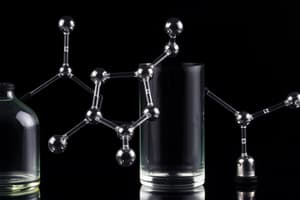Podcast
Questions and Answers
What is the pKA range for an alkyl alcohol (R-OH)?
What is the pKA range for an alkyl alcohol (R-OH)?
- 9 – 13
- 1 – 5
- 10 – 11
- 14 – 18 (correct)
Which type of amines is generally stronger in basicity, according to the classification provided?
Which type of amines is generally stronger in basicity, according to the classification provided?
- Tertiary amines
- Aromatic amines
- Secondary amines (correct)
- Primary amines
What is the estimated pKB range for aromatic and heterocyclic nitrogens?
What is the estimated pKB range for aromatic and heterocyclic nitrogens?
- 4 – 5 (correct)
- 3 – 4
- 10 – 13
- 1 – 4
Which group of organic weak bases is associated with the lowest pKB range?
Which group of organic weak bases is associated with the lowest pKB range?
Which of the following groups is NOT included as one of the organic weak bases discussed?
Which of the following groups is NOT included as one of the organic weak bases discussed?
What is the relationship in basicity strength among primary, secondary, and tertiary amines?
What is the relationship in basicity strength among primary, secondary, and tertiary amines?
Which of the following groups has an estimated pKA range of 12 - 13?
Which of the following groups has an estimated pKA range of 12 - 13?
What is the estimated pKA range for aromatic amine (Ar-NH2)?
What is the estimated pKA range for aromatic amine (Ar-NH2)?
What is the approximate pKB range for amides?
What is the approximate pKB range for amides?
Which statement is true about the nitrogen in amide functional groups?
Which statement is true about the nitrogen in amide functional groups?
How are amides classified in terms of acid-base properties?
How are amides classified in terms of acid-base properties?
What type of acids are capable of donating more than one proton per molecule?
What type of acids are capable of donating more than one proton per molecule?
Which functional group is not classified as a weak base?
Which functional group is not classified as a weak base?
Which of the following is a property of ampholytes?
Which of the following is a property of ampholytes?
In classifying amoxicillin, which functionality should be identified?
In classifying amoxicillin, which functionality should be identified?
What is a characteristic of monoprotic bases?
What is a characteristic of monoprotic bases?
What is the estimated pKA value of an aliphatic amine?
What is the estimated pKA value of an aliphatic amine?
Which functional group is classified as acidic with a pKA value of 3 - 5?
Which functional group is classified as acidic with a pKA value of 3 - 5?
Why are amides not classified as acids or bases?
Why are amides not classified as acids or bases?
What is the estimated pKA value of phenol?
What is the estimated pKA value of phenol?
Which of the following is NOT classified as an acid or base due to being an amide?
Which of the following is NOT classified as an acid or base due to being an amide?
What is the general classification of a thiol based on its pKA value?
What is the general classification of a thiol based on its pKA value?
Which functional group is identified as basic in nature?
Which functional group is identified as basic in nature?
How does the pH scale represent the concentration of hydrogen ions?
How does the pH scale represent the concentration of hydrogen ions?
What is the relationship between pH and pOH in any aqueous solution?
What is the relationship between pH and pOH in any aqueous solution?
What occurs when a strong acid like HCl completely dissociates in water?
What occurs when a strong acid like HCl completely dissociates in water?
If the pH of a solution changes from 1 to 2, how does the concentration of H3O+ change?
If the pH of a solution changes from 1 to 2, how does the concentration of H3O+ change?
What is the pH of a 0.1% w/v HCl solution given that the molecular weight of HCl is 36.5 g/mol?
What is the pH of a 0.1% w/v HCl solution given that the molecular weight of HCl is 36.5 g/mol?
What equation represents the calculation of pH for a strong acid?
What equation represents the calculation of pH for a strong acid?
For a strong base, how is pH calculated using its hydroxide concentration?
For a strong base, how is pH calculated using its hydroxide concentration?
Which statement correctly describes the concentration relationship between H3O+ and OH- in an aqueous solution at neutral pH?
Which statement correctly describes the concentration relationship between H3O+ and OH- in an aqueous solution at neutral pH?
Which method would you use to determine the pOH from a known pH?
Which method would you use to determine the pOH from a known pH?
What does a large value of KA indicate about an acid?
What does a large value of KA indicate about an acid?
What relationship exists between pK_A and KA for strong acids?
What relationship exists between pK_A and KA for strong acids?
Which of the following is a characteristic of weak acids?
Which of the following is a characteristic of weak acids?
What is the formula for calculating pK_A from KA?
What is the formula for calculating pK_A from KA?
Which acid is recognized as a strong acid?
Which acid is recognized as a strong acid?
Which of the following is true about weak acids?
Which of the following is true about weak acids?
In the dissociation of a strong acid, what happens to HA?
In the dissociation of a strong acid, what happens to HA?
Which of the following statements correctly describes strong acids?
Which of the following statements correctly describes strong acids?
Flashcards are hidden until you start studying
Study Notes
Acid-Base Properties
- Alkyl alcohols (R-OH) have a pKA range of approximately 14 – 18, indicating they are not ionized in realistic pH solutions (0-14).
- Organic weak bases can be categorized into five groups:
- Aliphatic and alicyclic amines
- Aromatic amines (Ar-NH2)
- Aromatic and heterocyclic nitrogens
- Amidines (R-CNH-NH2)
- Guanidines (RHN-CNH-NH2)
Basicity of Amines
- General strength of basicity for amines: Secondary > Tertiary > Primary.
- Estimated pKB ranges for different amines:
- Aliphatic amines: 3 – 4
- Aromatic amines: 9 – 13
- Aromatic heterocyclic nitrogens (pyridine, isoquinoline): 4 – 5
- Amidines: pKB range of 10 – 13 and pKA range of 9 - 10.
Classification of Organic Molecules
- Amides have a pKB range of 15 – 17, indicating they are not ionized in typical solution pH (0-14).
- Classification of organic compounds based on their acid/base functionality:
- Nonelectrolyte: No acid/base functionality.
- Monoprotic acid: Donates 1 proton/molecule.
- Polyprotic acid: Donates multiple protons/molecule.
- Monoprotic base: Accepts 1 proton/molecule.
- Polyprotic base: Accepts multiple protons/molecule.
- Ampholyte: Exhibits both acid and base functionality.
Functional Group Analysis: Examples
-
Amoxicillin:
- Aliphatic amine: Basic, pKA 10 - 11.
- Carboxylic acid: Acidic, pKA 3 - 5.
- Phenol: Acidic, pKA 8 - 11.
- Amide: No acid/base characteristics.
-
Captopril:
- Thiol: Acidic, pKA 9 - 11.
- Carboxylic acid: Acidic, pKA 3 - 5.
- Amide: No acid/base characteristics.
-
Cefaclor:
- Aliphatic amine: Basic, pKA 10 - 11.
- Carboxylic acid: Acidic, pKA 3 - 5.
- Amide: No acid/base characteristics.
pH Calculations
- pH is calculated using the formula: pH = - log[H3O+].
- pH and pOH relationship: pH + pOH = 14.
- Strong acids (like HCl) and bases (like NaOH) completely dissociate in water.
Acidity Constants
- KA represents the equilibrium constant for a weak acid (HA) dissociation:
- HA ⇌ H3O+ + A−
- pKA can be expressed as: pKA = - log(KA).
- Strong acids have large KA values indicating complete dissociation, resulting in low pKA values (often negative). Weak acids produce smaller KA values reflecting partial dissociation.
Studying That Suits You
Use AI to generate personalized quizzes and flashcards to suit your learning preferences.




